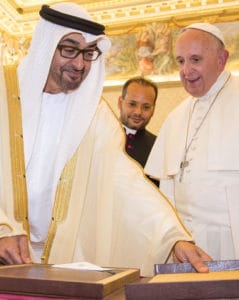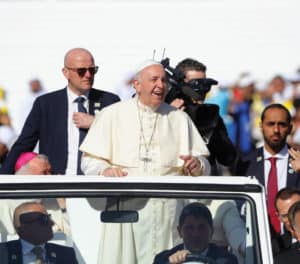How can we possibly identify universal fraternity as a primary objective of today’s humanity? Are we not in an age dominated by digital bubbles, with ever more divisive personal and collective boundaries, and new forms of economic protectionism and so on?
However, the declaration signed in Abu Dhabi by Pope Francis and the Imam of Al-Azhar places the values of fraternity at the heart of the geopolitical and media agenda. With a clear and practical approach, the declaration proposes fraternity as the guiding objective, not only for the Christian and Muslim religions but for the entire human family.
Roberto Catalano outlined the steps leading up to this important document which is being recognized as a foundation step in dialogue towards world peace.
How significant is the declaration signed by Pope Francis and Imam Al-Tayeb in Abu Dhabi on 4 February this year?
This document on fraternity represents a significant milestone and the text will remain as a reference point for the future. It’s impossible not to see how profoundly innovative it is. Once more we find ourselves before one of Pope Francis’ “absolute firsts”!
Never before in the history of the Church has a pope co-signed a shared document with the leader of another religion. This document was signed in a very precise context, a meeting between the leaders of the Catholic Church and of Al-Azhar, characterized by a mutual embrace, talks, and even walking hand in hand. The agreed text addresses not only religious leaders or interested parties but all believers and, in fact, everyone in the world.

The United Arab Emirates can be seen as a cross section of the globalized world: the Arabian Peninsula is the heart of Islam, but there is a growing number of workers in this region from other countries and cultures….
Abu Dhabi, the capital of the United Arab Emirates and the venue for the signing of this declaration, is on the southern coast of the Persian Gulf. All the Gulf States are significant due to their economic and geopolitical status.
In only a few decades, their oil reserves have permitted a dizzying rate of progress, facilitated also by workers from countries such as the Philippines, India, Pakistan, and Bangladesh.
The Arabian Peninsula is the heart of Islam, but it also presents a true Muslim mosaic. Saudi Arabia dominates the region, as the image of Sunni Islam which identifies with Wahhabism, which on the international level supports the Salafi movement.
Within this context, there is the emerging phenomenon of new Christian communities. Whereas the traditional apostolic Christian Churches of the Middle East continue to live through dramatic events which often cause them to flee the region, the area of the
Emirates is becoming populated with a new set of Christians, a real cross section of today’s Christianity. The majority of these Christians are from the Philippines and India, but also from other parts of the Middle East. We are living in a period of globalization, and the Church in the Emirates is a striking example of this.
During Pope Francis’ recent visit to Morocco, the 800th anniversary of the meeting between St. Francis of Assisi and Sultan Al-Malik Al-Kamil was celebrated. It seems this pope has embarked upon something of a “pilgrimage of peace.”
Absolutely. And the Abu Dhabi declaration fits in with this anniversary, as a sign of the desire to be a “brother who seeks peace with his brothers” and “to be instruments of peace.”

Nostra Aetate, the Second Vatican Council’s Declaration on the Relation of the Church with Non-Christian Religions, states that “in the course of centuries not a few quarrels and hostilities have arisen between Christians and Muslims” and so the Council strove to urge “all to forget the past and to work sincerely for mutual understanding and to preserve, as well as to promote together for the benefit of all mankind, social justice, and moral welfare, as well as peace and freedom.”
In 2006, a passage from Benedict XVI’s Regensburg lecture sparked controversy in the Muslim world. Many took offense at the quotation, even though it referred not to the Qur’an but to the relationship between faith and reason, and between religion and violence. It led to a period of stormy relationships, during which the University of Al-Azhar cut off contact with the Vatican.
In the years that followed, with great patience and diplomacy, these relationships have been rebuilt, in the spirit of Evangelii Gaudium, which after defining interreligious dialogue as a “duty for Christians as well as other religious communities” (EG 250), affirmed the importance of Christian-Muslim relations.
Finally, in May 2016, Imam Al-Tayeb came to the Vatican. On his arrival, he made a significant comment: “We are taking up the way of dialogue once more and we hope it will be better than before.” The invitation and welcome were soon reciprocated. In 2017, the Imam invited Pope Francis to Cairo for an International Peace Conference.
On that occasion, the Pope strongly affirmed: “Peace alone is holy and no act of violence can be perpetrated in the name of God, for it would profane his Name.” He went on to propose three basic areas which, if properly linked, can “assist in this dialogue: the duty to respect one’s own identity and that of others, the courage to accept differences, and sincerity of intentions.” From then on, a deep spiritual understanding has grown between the two religious leaders.




